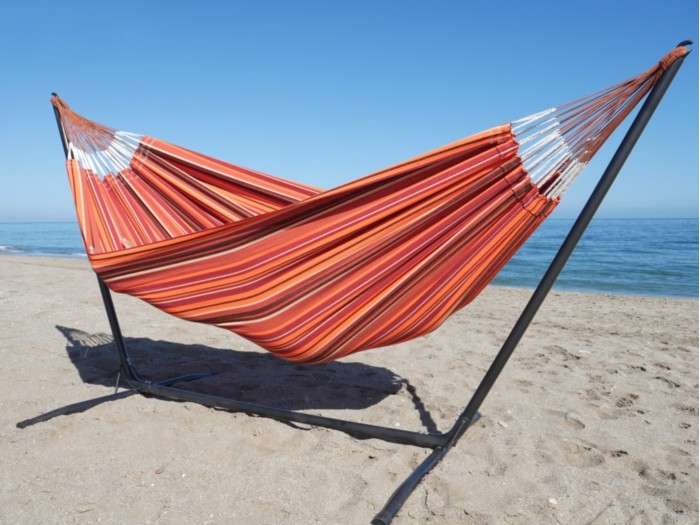- Pack















Including €0.80 for ecotax
Reference: INKAandalouXXL
Anthracite grey metal stand and XL Andalou model hammock from our latest collection. The specific dimensions of this stand ensure an ideal curve of the hammock for better comfort. Sturdy, this stand will also be easy to assemble and disassemble for winter storage periods. The XXL Andalou hammock is made in Colombia from recycled cotton. Spacious and pleasant to the touch, it will be ideal for solo or duo use. Machine wash at 40°
Anthracite grey metal stand and XL Andalou model hammock from our latest collection. The specific dimensions of this stand ensure an ideal curve of the hammock for better comfort. Sturdy, this stand will also be easy to assemble and disassemble for winter storage periods. The XXL Andalou hammock is made in Colombia from recycled cotton. Spacious and pleasant to the touch, it will be ideal for solo or duo use. Machine wash at 40°
We are all influenced by the price of the items we browse on the Internet, yet there is a world of difference between two styles of freestanding hammocks. Price, warranty, and the advertised lifespan are the main factors that hold you back. However, almost always, comfort is overlooked even though it is just as important. Let me explain: there are two styles of hammocks, one with wooden spreader bars (the Western version of the hammock) and one without (the Latin American version, our specialty, our passion). The one with wooden bars must be stretched during installation (positioned lengthwise only and on the back), while the one without must be curved (positioned diagonally flat, curled up like a foetus, or seated). Yet, most offers on the Internet concern stands made somewhat for both styles.
The ratio between the length and height of the hammock's foot is crucial for the final comfort.If your hammock is too tight, you will be stuck and curved like a banana in its fabric. If it is curved, you will lie flat comfortably with a soft and stretchable bedding.
At Tropical Hammock, we have been working directly with support manufacturers for a long time to be able to offer you properly sized supports. In fact, between 1995 and 2005, we even made our own models in our workshops before hammock supports in the shape of an arc appeared, thanks to laminated wood. Take a close look at the heights of a hammock stand with us, and you will see that they have nothing to do with the competition.
Metal can be eternal but with a minimum of care. The material used is not stainless steel, so this support will eventually rust. The first signs of rust will mainly appear in areas where there is friction (junctions between tubes, screw locations). Here in our oceanic salty climate, we notice rust appearing after 2 to 3 years. There is a miraculous paint for this support. Find a 0.5-liter can at your local DIY store from the brand "Hammerite." This very thick paint, containing tiny magnetic metal beads, is applied in a single coat with only light sanding beforehand. There is no need to apply a rust inhibitor. A single coat of this paint will protect the metal for about 3 years.
Just like with the stands, nowadays you can find all kinds of hammocks online. As French people, we know how to choose a camembert from a wide selection, but when it comes to hammocks, we don't have the same expertise. I would like to tell you to trust us—enthusiasts—it's a pleasure to be able to advise you since 1988, back when the Internet didn't even exist. But I will still explain a few important facts you should know. There are details that are easy to compare. The weight of the product (a good indicator of its durability):
- La composition of the thread which must have as little polyester as possible (for softness and good contact with the skin)
- The size of the canvas (rely on the measurements and not on the labels "2-seater" "family") because a two-seater starts at 160 cm in width and not 100 cm as can be seen on some websites
- The number of suspension cables.
But there are two things you will never be able to know:
The quality of the thread used and the weaving method (Will the fabric eventually sag or not?). For me, the thread used is the most important detail of a hammock. When I arrive at a factory, the first thing I do is test the thread. Then, I head to the dyeing machine (cold? hot? under pressure? Computer-controlled?). Today, technology has advanced and we are using recycled cottons with very strong colors. Be careful, depending on the source, you might end up with a hammock that stretches so much that you will feel like you're trapped in a pocket!
Also be cautious of hammocks that are promised to be guaranteed for outdoor use. Their material names sound appealing, but in reality, they are just 100% polyester. In other words, plastic. These hammocks are hot, sometimes static, UV rays have a negative effect on polyester (premature degradation of the thread), they age very poorly after a few machine washes, and mold fungi still develop on them.
Don't forget that it is your skin that will be in direct contact with your hammock. Treat it gently !
A hammock is a textile product that can be machine washed. A Brazilian who sleeps every night in this hammock washes it approximately every 10 to 15 days. For us, who mainly use it outdoors, it is therefore essential to wash it at least once a year at the end of the season in a machine at 40°C, dry it well outside (no tumble dryer), and store it in a dry place during the winter.
For more essential information on using a hammock, I recommend watching our video:The 6 tips.
Quality, ethics, durability, longevity, and comfort. A Tropical hammock offer! Passion for hammocks since 1988.
Data sheet
